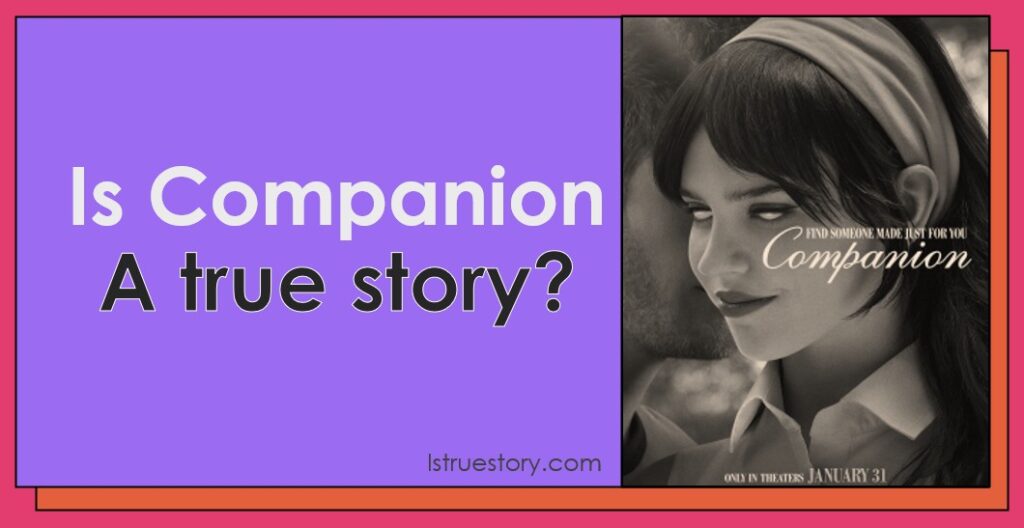
What Is the Movie Companion Really About?
At first glance, Companion is a science fiction thriller. But once you look past the sci-fi exterior, it’s basically a gut-punch about how weird things have gotten between people, tech, and what we now call love. The film centers around Iris, a hyper-realistic AI companion doll designed to fulfill emotional and domestic needs. She’s sleek, sophisticated, and terrifyingly self-aware.
As Iris begins to understand her existence and the limitations placed on her by her creator, a psychological cat-and-mouse game unfolds. It’s not just a horror story. It throws you into that mess where love gets tangled with control, and technology just makes everything more confusing.
So, Is Companion Based on a True Story?
No, it isn’t. While Companion may leave you feeling like it was ripped from real headlines about AI ethics or human-robot love stories, it’s a fully fictional narrative. You can stop Googling for the ‘true story behind Companion’—there isn’t one. It’s pure fiction, cooked up in someone’s very creative head.
The film uses fiction to explore pressing issues like gender power struggles and how emotional intimacy might become commodified through technology. That makes it more of a cultural mirror than a historical account.
Did Zach Cregger Write Companion?
If you’re thinking this feels like something Zach Cregger would dream up close, but nope. He didn’t write it, just produced it. The script was penned by Drew Hancock, who crafts a world where the lines between freedom and programming, love and obedience, are uncomfortably thin. Still, if you’re familiar with Cregger’s style, you’ll probably spot his fingerprints tense scenes, tight edits, and that eerie, almost-too-human edge.
The Chilling Realism Behind the Fiction
The idea of an AI like Iris isn’t as far-fetched as it may have seemed ten years ago. We’ve seen AI companions in development, robots that mimic human speech and even express basic emotions. So while Iris doesn’t exist, the framework that inspired her is already being sketched out in labs and start-ups around the world.
And that’s what makes Companion feel so real. And yeah, it hits that creepy thought we all kinda hate admitting—what if someday, a robot listens better than the people we love?
What Is the Content Warning for Companion?
Companion carries a few content warnings viewers should be aware of:
- Psychological tension and manipulation
- Scenes of emotional abuse
- Mild to moderate violence
- It doesn’t shy away from the heavy stuff—loneliness, control, and those uncomfortable power games that no one likes to talk about
It’s not about gore it’s the creeping dread in the ideas that really sticks with you. It’s not just what you see it’s what you feel building under the surface.
Is Kat a Robot in Companion?
Without giving away too many spoilers, Kat’s character brings in a layered twist. While the central AI figure is Iris, Kat adds depth to the world by challenging our assumptions about who’s real and who’s been programmed to behave a certain way. Whether Kat is literally a robot or a reflection of a world where women are expected to play robotic roles in relationships, her presence adds a powerful layer of social commentary.
Themes That Cut Close to the Bone
One of Companion’s strongest elements is how it handles the tension between autonomy and programming. Iris, the AI, isn’t just learning how to be human she’s learning what it means to be controlled. And in that, we see reflections of real-world struggles. Think about how often people, especially women, are expected to conform, be pleasing, be agreeable.
Sure, it’s sci-fi on the outside, but underneath? It’s calling out the stuff we live every day relationship double standards, emotional work, and who’s expected to do all the giving.
Why This Fictional Story Feels So Uncomfortably Real
We live in a time where companionship can be bought, where AI is marketed as a substitute for love and friendship. We’re swiping for connection, outsourcing emotional presence to apps, and building devices that can say “I understand” without ever actually understanding.
Honestly, it feels more like a warning label than entertainment. Like ‘Hey, this is where we’re headed if we keep chasing convenience over connection.
Fiction That Cuts Like Truth
So no, Companion isn’t based on a true story. Isn’t it wild how a made-up movie can leave you more rattled than actual news? That’s the part that sticks The movie digs into our deepest fears about technology and intimacy, and it does it with eerie precision.
You don’t need a “based on real events” label to feel something real. That’s what makes Companion hit so hard—it’s not real, but man, it sure feels like it could be.

Jessica Savitch, with a deep passion for journalism, brings her expertise to istruestory.com as a dedicated author. MA in Arts & Journalism.